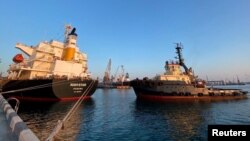Three more ships carrying thousands of tons of corn left Ukrainian ports Friday in a sign that a deal to allow exports of Ukrainian grain held up since Russia’s invasion of its neighbor in February is starting to work.
The three ships departed for Ireland, the United Kingdom and Turkey. Another ship, the Razoni, left on Monday from Ukraine bound for Lebanon carrying the first grain shipment through the Black Sea since the start of the war.
In New York Friday, United Nations spokesman Stephane Dujarric said another ship is headed toward the Ukrainian port of Chonomorsk to pick up a grain shipment.
The U.N. and Turkey recently brokered a deal, the Black Sea Grain Initiative, aimed at enabling Ukraine to export about 22 million metric tons of grain currently stuck in silos and port storage facilities. The deal is meant to ease a global food crisis marked by soaring prices and food shortages in some regions.
Ukraine and Russia are key global suppliers of wheat, corn, barley and sunflower oil that millions of people in Africa, the Middle East and parts of Asia rely on for survival.
In another hopeful sign, Ukraine’s first deputy minister of agriculture said the country could start exporting wheat from this year's harvest through its seaports as early as next month. According to Reuters, Ukraine hopes in several months to increase shipments of grain through the route to between 3 million and 3.5 million metric tons per month from 1 million metric tons expected in August, the official, Taras Vysotsky, said.
The initiative will run for a 120 day-period that ends in late November.
There is a backlog of nearly 30 ships that have been stranded in Ukraine’s southern ports as a result of the war now in its sixth month. The JCC (Joint Coordination Center) set up under the deal says the ships need to move out so other ships can enter the ports and collect food for transport to world markets, as the Black Sea Grain Initiative envisages.
The crew and cargo of the vessels that set sail Friday will undergo checks when they arrive at the JCC inspection area in Turkey’s territorial waters before moving on toward their destinations.
The JCC says that, based on its experience with the first ship that sailed Monday, it is now testing moving multiple ships in the safe corridor, both outbound and inbound.
Meanwhile, Turkish President Recep Tayyip Erdogan visited Russia on Friday for talks with President Vladimir Putin that are expected to focus on the grain deal, prospects for talks on ending hostilities in Ukraine, and the situation in Syria.
Meanwhile, Ukrainian President Volodymyr Zelenskyy blasted human rights group Amnesty International for a report that said Ukrainian forces have put civilians in harm’s way by establishing bases and operating weapons systems in populated residential areas.
Zelenskyy said the report “unfortunately tries to amnesty the terrorist state and shift the responsibility from the aggressor to the victim.” He said, “There cannot be, even hypothetically, any condition under which any Russian attack on Ukraine becomes justified. Aggression against our state is unprovoked, invasive and openly terroristic.”
The head of Amnesty’s Ukrainian office, Oksana Pokalchuk, also took issue with the report and in posts on Facebook said the Ukrainian office “was not involved in the preparation or writing” of the report and tried to prevent the material from being published.
Amnesty said its researchers investigated Russian strikes in Ukraine between April and July in the Kharkiv, Donbas and Mykolaiv regions. The organization said its “researchers found evidence of Ukrainian forces launching strikes from within populated residential areas as well as basing themselves in civilian buildings in 19 towns and villages in the regions.”
“Viable alternatives were available that would not endanger civilians – such as military bases or densely wooded areas nearby, or other structures further away from residential areas,” Amnesty said.
Amnesty said that in the cases it documented, it was “not aware that the Ukrainian military who located themselves in civilian structures in residential areas asked or assisted civilians to evacuate nearby buildings – a failure to take all feasible precautions to protect civilians.”
Meanwhile, NATO Secretary General Jens Stoltenberg said Thursday the Western military alliance has the joint tasks of supporting Ukraine in its fight against a Russian invasion and preventing the conflict from spreading into a war between Russia and NATO.
Speaking to a summer camp in his native Norway, Stoltenberg said NATO has a moral responsibility to support Ukraine and the Ukrainian people who have been subjected to a war of aggression.
“We are seeing acts of war, attacks on civilians and destruction not seen since World War II,” Stoltenberg said, according to a NATO release of his prepared remarks. “We cannot be indifferent to this.”
Stoltenberg said the world will be a more dangerous place if Russian President Vladimir Putin gets what he wants through the use of military force.
“If Russia wins this war, he will have confirmation that violence works. Then other neighboring countries may be next,” he said.






